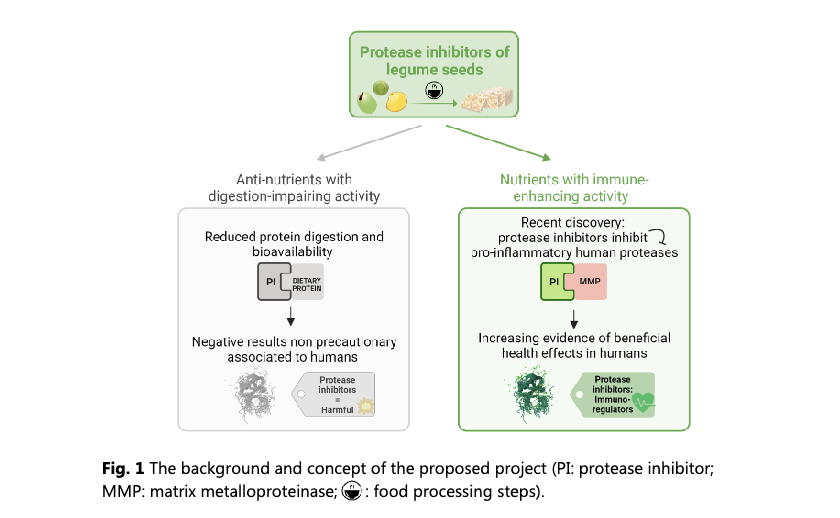Immune SEEDstem
"The flip side of protease inhibitors from pulses: legume seeds as immune system enhancers"
The Immune SEEDstem project strives to re-evaluate pulse protease inhibitors as unforeseen gut-beneficial immunomodulatory food ingredients (e.g., anti-inflammatory), key to prevent gut diseases. The goal of the Immune SEEDstem project is to explore the immune-boosting effects of protease inhibitors (PI) found in legume seeds, commonly known as pulses, to potentially safeguard against gut-related illnesses and promote overall immune balance.
⌐ The project has been granted 6.999.646 DKK in funding.
⌐ The project starts on 1 March 2024 and will end on 31 August 2027.
Introducing the ImmuneSEEDstem project
The flip side of protease inhibitors from pulses: legume seeds as immune system enhancers
The ImmuneSEEDstem projects aim to generate new unique knowledge on the immune-balancing activity of pulse protease inhibitors (PI), potentially crucial to prevent immune-related gut diseases and to balance our immune system.
Background for the project
The transition from animal to plant proteins is needed to ensure humans' and planet's health. Legume seeds, called ‘pulses’, are an excellent sustainable and healthy alternative to animal proteins. Global incidence rates of gut inflammatory diseases are escalating, and DK-northern EU are among the worldwide leading countries. Gut inflammation leads to upregulation of matrix metalloproteinases (MMP), whose inhibition can prevent chronic disease development. Pulses are a rich source of bioactive compounds with potential immune-modulating activity. Up to 10% of pulse proteins are protease inhibitors (PI), known for impairing dietary protein digestibility and bioavailability. However, their health-promoting properties in adults and infants have been suggested, but only limitedly documented. It has been shown that lupin seeds contain PI that efficiently resist digestion and inhibit MMP in the gut.
The activities
Immune SEEDstem strives to re-evaluate pulse PIs as unforeseen gut-beneficial immunomodulatory food ingredients (e.g., anti-inflammatory), key to prevent gut diseases. Along the whole value chain from raw food material to consumable product, it is hypothesized that intrinsic and extrinsic factors lead to PI modifications. After ingestion and digestion, PI may inhibit major players of diet-associated pathologies of the gastrointestinal tract (the MMP) and thereby mitigate immune-related diseases. Pulses with various content of active PIs will be characterized after defined food processing steps with state-of-the-art analytical platforms. Next, gut inflammation processes will be mimicked to disentangle the interplay between PI, MMP and inflammation resolution.
The outcome
As far as it is known, this research will be the first to look into bio-functional properties of pulse PI from raw material to post-food processing and digestion. Three main knowledge gaps are identified: (1) information about factors regulating content and activity of pulse PI, (2) PI hydrolysis and activity degrees in a food matrix when food processing and simulated human digestion are applied, (3) PI immune-balancing role in infant and adult gut, acting against specific endogenous pro-inflammatory enzymes, i.e. matrix metalloproteinases.



